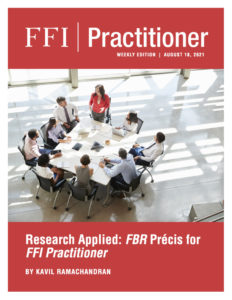
View this edition in our enhanced digital edition format with supporting visual insight and information.
Thank you to this week’s contributor and member of the Applied Research Board, Kavil Ramachandran, for his précis of “Kinship and Gender in Family Firms: New insights into employees’ organizational citizenship behavior.” The article appears in the September 2021 issue of FBR. In the précis, Prof. Ramachandran provides a summary of the research and key findings of the article and explores the practical implication of the research for families, advisors, and researchers in the field.
Workplace contributions by employees that are beyond their formally assigned job roles and responsibilities are known as Organizational Citizenship Behavior (OCB). OCB includes extending extra-role support due to care and concern for the organization. Firms aim to promote employee OCB because it enhances organizational productivity, performance, and efficiency. Extant research has established that employee characteristics, their perceptions of justice, and certain leadership behaviors are some of the contributing factors of employee OCB. However, the OCB phenomenon remains inadequately examined in the family firm context, which is distinct due to kinship ties and overlaps between family and business systems. Family business researchers Kristen Madison, Kimberly Eddleston, Franz Kellermanns, and Gary Powell address this crucial knowledge gap through their study. Using survey responses from 209 family CEO-employee pairs from U.S. family firms, they examine the relationship between kinship ties, gender, and employees’ OCB. This précis briefly describes the study and its implications.
Altruistic Leadership and OCB
OCB can correlate with the employee’s concern and loyalty towards the organization. Employees who develop trust and regard for their organization may take additional responsibility and engage in OCB. This behavior promotes a sense of community for the family firms, which is crucial for their long-term development. The leadership of family firms plays an important role in promoting and enhancing OCB in employees. It bolsters the socio-emotional goals of the family and fosters a stewardship climate through engagement and collaboration. The leader of the firm can nurture the environment of care and compassion, which in turn is reciprocated by employees. The altruistic behavior of the leader inspires the employees to engage in similar deeds. Therefore, this promotes employees’ discretionary behaviors, such as OCB.
Influence of Kinship
Social identity theory1 posits that individuals tend to relate to people they perceive as similar to themselves. They classify themselves into groups based on race, age, gender, and ethnicity. Dissimilarities between these groups can create workplace anxiety,2 which may lead to negative emotions and affect performance.3 In a family firm context, family employees consider themselves as a different group compared to non-family peers.4,5 The shared vision, values, and norms of the family employees facilitate stronger bonds with the family business leader. Hence, the authors theorize that employees who share kinship, i.e., family employees, are more likely to respond to altruistic leadership by engaging in OCB.
Of the various relationships in the family such as spouses, siblings, and cousins, the bond between a parent and child is one of the strongest familial bonds. Attachment theory6 suggests that children’s strong bonds with adult caretakers encourage the exchange of supportive behaviors. These bonds and attachment patterns, formed in childhood, continue to affect family members in their adult lives.7 Children who view their parents’ altruistic behavior often develop similar behaviors.8 In a family firm context, parents are dependent on their children to maintain the business in posterity, and children rely on parents for resources and autonomy.9 Therefore, the authors hypothesize that a family employee is likely to demonstrate higher levels of OCB if s/he is the child of the family business leader.
The Role of Gender
Organizational research has indicated that men and women value different leadership styles and behaviors. For example, research suggests that women value leaders who are considerate10 and supportive,11 while men favor leaders with qualities such as authoritativeness and status.12 These differences persist in family firms as gender role expectations percolate from the family domain to the business domain.13,14,15,16 Female family members are socialized17,18 to join the business to support the family,19,20,21 whereas male family members are socialized22,23 have an intention to lead the firm someday.24,25 Based on this research, the authors hypothesize that daughters and sons of the CEO differ in their OCB responses. Daughters are more likely to assume the gender norms and have greater emotional attachment to the business,26,27 which suggests to the authors that daughters demonstrate high levels of OCB, regardless of the level of leaders’ altruistic behavior. By extension, then, the authors posit that sons may view leaders’ altruistic behavior as a signal to their prospective leadership status, which in turn could motivate them to exhibit high levels of OCB, as compared to the other male family members involved in business.
Key Findings:
Based on the statistical analysis of data, the authors found the following:
- High levels of altruistic behavior of the family business leader promote employee OCB in family firms.
- The OCB of the family employee is higher in response to the altruistic leadership if the family employee is the child of the family business leader/CEO.
- The OCB is dependent upon the family employee’s gender. The employee reciprocates highest levels of OCB if he is the son of the family CEO.
Readers may refer to the ‘Methodology’ section of the paper to know more about the research design and specific measures that the authors analyzed.
Implications of the Study:
For Research
- This study extends the organizational behavior literature by explaining the boundary conditions of existing OCB relationships. The altruistic leadership enhances OCB in employees, though it is conditional upon kinship ties and gender of the employees.
- This research underscores that kinship is a vital demographic within family firms. These ties have been shown to have significant effects on family firm dynamics. Therefore, the study also extends the relational demography theory.
- This study also contributes to gender research by examining the distinctive OCB exhibited by men and women in family firms.
For Family Firms
- The study prompts family firms to discuss and strategize the ways to promote OCB within employees. OCB and kinship ties are now even more relevant in present pandemic conditions that have hugely affected employee team orientation and loyalty, which have become increasingly transactional.
- It is important to recognize that employees are driven by different objectives and motivations. Hence, to ensure positive behavioral outcomes like OCB, family firms must avoid a ‘one-size-fits-all’ approach.
- Altruistic leadership behavior can inspire employees to exhibit enhanced levels of OCB. However, OCB will be more effective when the family firm crafts customized solutions that encourage OCB from all categories of employees and boost their pro-organizational behavior.
For Advisors
- Practitioners can help their family business clients identify different types of employees and their motivations within the organization. They can facilitate discussion on methods to promote OCB within various employee groups.
- Family business advisors can offer guidance to their clients on how the kinship ties and gender play a major role in encouraging the OCB of the employees.
- While offering advice on promoting the OCB of employees, it is essential to consider several approaches to motivate each employee category, such as female family employees and non-family employees.
About the Contributor

Kavil Ramachandran is Professor and Executive Director, Thomas Schmidheiny Centre for Family Enterprise, Indian School of Business, Hyderabad, India. He can be reached at K_Ramachandran@isb.edu.

View this edition in our enhanced digital edition format with supporting visual insight and information.





